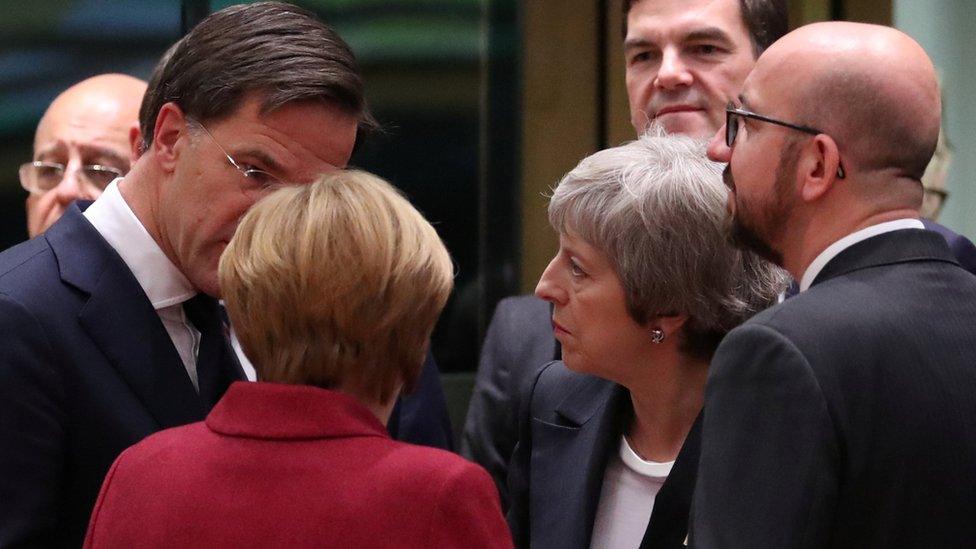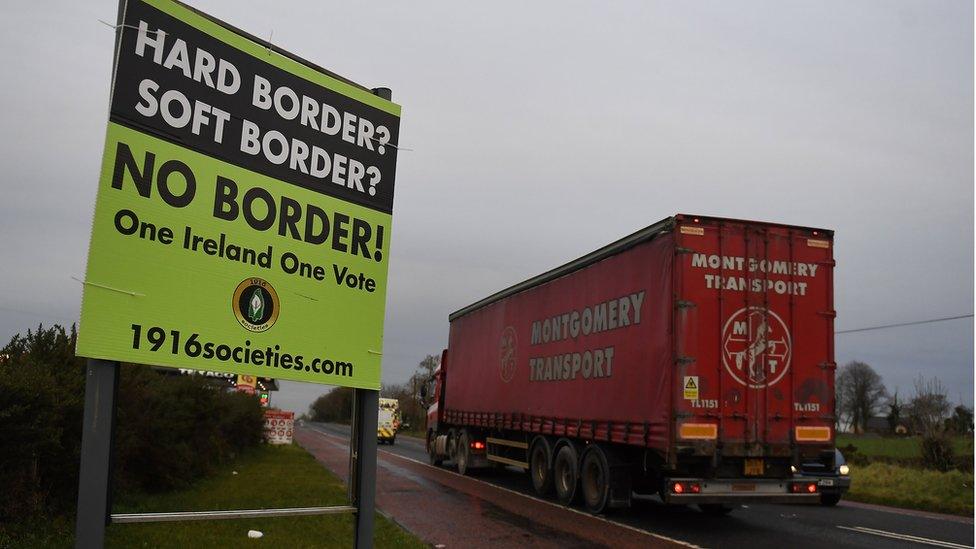Brexit: EU pledges to May unlikely to placate critics
- Published

It was a tough diplomatic test for Theresa May (3rd R)
Led by German Chancellor Angela Merkel, the other 27 leaders spent almost an hour last night asking Theresa May questions.
What reassurances did she seek on the Irish backstop? How did she intend to get the Brexit deal through parliament? What was her vision for the future relationship between the UK and the EU?
A diplomatic summary of the meeting seen by the BBC said her answers were "not really clear".
"Bad" and "pretty bad" is how it was described by some usually-optimistic diplomats.
The lack of precision made the EU wary of offering anything too detailed in the written summit conclusions.
Ireland added wording about the backstop being a Europe-wide issue, not just an Irish one.
The backstop is described as an insurance policy to keep the Northern Ireland border open, as it is now.

The Northern Ireland border: Now the trickiest Brexit issue to resolve
There was no support for Paragraph Five of the draft document, which committed the EU to explore other options to assist the UK.
That came as a surprise to the British government, which had secretly helped to draft the summit statement.
But European diplomats said that David Cameron's renegotiation of the UK's membership, before the UK's 2016 Brexit vote, played on the leaders' minds - why offer anything that would instantly be ripped apart, or wouldn't work?
And why do it now, when a parliamentary vote is still weeks away?
'Nebulous' row
Others fear the focus on tweaking the backstop is preventing the UK from preparing for the negotiations over its new partnership with the EU, storing up bigger problems for the future.
Jean-Claude Juncker : "We were not dancing... she thought that I did criticise her"
In the middle of all of this, European Commission President Jean-Claude Juncker described the situation in the UK as "nebulous".
The television cameras captured a miffed-looking Theresa May saying to him something that looked like "You called me nebulous. Yes, me! Nebulous!"
He later clarified that he had meant the picture in the House of Commons was "foggy".
But it's not hard to detect another dig at the prime minister's expense - that she has failed to create a consensus around her Brexit deal.
The moment Theresa May challenged the EU's Juncker
Yet Theresa May's mission to Brussels has not been a failure.
She has a written statement from her 27 fellow leaders confirming - reconfirming, really - that the Irish backstop is an insurance policy which would only ever be temporary.
If the backstop is activated, then the EU would use its "best endeavours" to negotiate a trade deal, which would mean it could be deactivated.
That wording is crucial, say British officials, because it means the UK could refer the EU to the independent arbitration panel established in the Brexit treaty if London felt Brussels was moving too slowly.
Sceptical Brexit camp
The EU dropped a commitment to look for further ways to help the UK, which means there won't be a formal process to find them.
But it doesn't mean the search couldn't happen informally, or in private, or at the last minute.
The problem is that these commitments are unlikely to impress Theresa May's harshest critics.
And they certainly wouldn't fit on the side of the bus as reasons to sign up to Mrs May's Brexit deal.